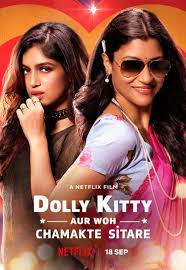Dreams, desires, and societal norms collide in this feminist dramedy starring Konkona Sen Sharma and Bhumi Pednekar. Set in the bustling suburbs of Greater Noida, the film explores the lives of two cousins navigating the complexities of relationships, independence, and self-discovery. Directed by Alankrita Shrivastava, it is a poignant exploration of womanhood wrapped in the vibrancy of small-town India. The genre blends drama, humor, and social commentary to deliver a story that’s both relatable and thought-provoking.
The plot revolves around Radha (nicknamed Dolly), a middle-class wife juggling societal expectations and a dysfunctional family, and her younger cousin Kaajal, who arrives in the city seeking financial independence. As Dolly aspires for a better life, her frustrations with her marriage grow, and she begins to confront her own desires. Kaajal, on the other hand, takes up a job at a phone companionship service, adopting the alias “Kitty,” and begins exploring her autonomy and sexuality. Their parallel journeys are a testament to their resilience and rebellion against the patriarchy that confines them. Their choices lead them to moments of triumph and heartbreak, weaving a narrative of empowerment without glossing over the messiness of real life.
Konkona’s performance as Dolly is effortlessly layered. She captures the essence of a woman grappling with her unfulfilled dreams and the guilt of wanting more. Her expressions and body language convey the unspoken frustration of being trapped in a loveless marriage. Bhumi, as Kaajal, brings a refreshing candor to her portrayal of a small-town girl discovering her individuality. She balances vulnerability and defiance, making her character both relatable and inspiring. Together, their chemistry as cousins is one of the film’s strengths, as they share moments of both conflict and camaraderie that feel authentic. Supporting actors like Vikrant Massey, Amol Parashar, and Aamir Bashir add depth to the narrative, with their nuanced performances enriching the story.
The direction by Alankrita Shrivastava is sharp and unapologetic. Known for her feminist narratives, Alankrita continues her exploration of women’s agency, following her critically acclaimed Lipstick Under My Burkha. The screenplay strikes a delicate balance between humor and introspection, ensuring the themes resonate without becoming preachy. The dialogues are realistic and impactful, capturing the pulse of small-town India while addressing universal issues.
Cinematography by John Jacob Payyapalli complements the narrative beautifully. The vibrant colors of the city juxtapose the protagonists’ inner struggles, reflecting their emotional states. The depiction of cramped urban spaces, vibrant marketplaces, and modern offices creates an immersive setting that enhances the authenticity of the story. The camera often lingers on small, everyday moments—an argument in the kitchen, a quiet ride on a scooter—adding depth to the storytelling.
The music and background score by Arjuna Harjai subtly underscore the emotions of the characters. The songs, though not the centerpiece, are well-integrated into the narrative, with tracks like “Bimari” echoing the themes of rebellion and desire. The background score is understated yet effective, never overshadowing the dialogues but heightening the emotional resonance of key scenes.
Costume design plays a crucial role in defining the characters. Dolly’s wardrobe, comprising simple sarees and salwar suits, reflects her constrained life, while Kaajal’s evolving fashion choices mirror her growing confidence and rebellion. The attention to detail in the costumes helps ground the characters in their socio-economic context, making them feel more relatable.
The film delves into a range of themes, from sexual agency and societal hypocrisy to the pressures of domestic life and the allure of independence. It challenges the notion of “perfect womanhood,” portraying its protagonists as flawed yet determined individuals who dare to defy societal norms. By addressing taboo topics such as marital dissatisfaction and sexual exploitation, the film opens up conversations that are often avoided in mainstream cinema.
Editing by Charu Shree Roy ensures the narrative flows seamlessly, with each subplot receiving adequate attention. The intercutting between Dolly’s and Kaajal’s journeys keeps the audience engaged, while the pacing allows for moments of quiet reflection amidst the chaos. However, the film does falter slightly in its third act, where certain resolutions feel rushed, and the emotional impact of some scenes could have been heightened with more screen time.
Overall, this is a bold and heartfelt film that celebrates women’s right to dream, desire, and demand more from life. Its unflinching portrayal of the challenges women face—both from society and within themselves—makes it a powerful watch. While it may not appeal to viewers seeking conventional storytelling, it offers a refreshing perspective for those open to introspection and nuanced narratives. Recommended for anyone who appreciates stories of empowerment with a touch of realism and humor.







